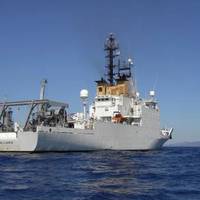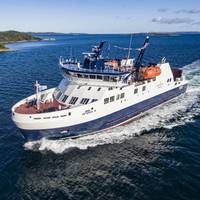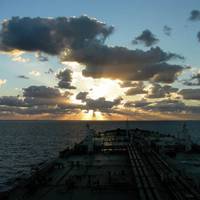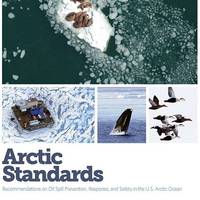Training Tips For Ships - Tip #23: Is Your Training Technology Disaster-Ready?

A customer once told me that they had just completed a business continuity analysis and had identified their LMS as their second most mission-critical technology - second only to payroll! Take a moment to consider how much you rely on training technologies to sustain your operations and compliance. How long could you comfortably go without your employees having access to training? How long could you go without access to your compliance records or your employees’ certificates?
NATO RV Alliance is not just quiet, it’s ice-capable

An interview with Ian Sage, director for marine operations, NATO Center for Maritime Research and Experimentation, La Spezia, Italy.NATO’s 3,100-ton, 305-foot research vessel NRV Alliance has been a leading platform for underwater acoustics research to the benefit of NATO navies. The ship operated with a civilian crew under the German flag for many years for the NATO SACLANT Center, later renamed the NATO Undersea Research Center, and now known as the NATO Center for Maritime Research and Experimentation. Now Alliance flies a new flag, and has a broader mission.
DP Documents Revised, Published by IMCA

Two International Marine Contractors Association (IMCA) documents, often written into contracts by clients, have been fully revised and published. ‘Guidelines for the Design and Operation of Dynamically Positioned Vessels’ (IMCA M103 Rev 2), and ‘Guidance on Failure Modes & Effects Analyses (FMEA)’ (IMCA M166 Rev 1) are both now freely available on the IMCA website. “Both important documents were reviewed using the IMCA ‘open forum’ web-based system introduced last year,” explains IMCA’s Technical Director, Richard Benzie. “This made for wide stakeholder engagement.
Damen Builds RoPax Ferry for Canada

The Damen 80-meter ice class RoPax ferry MV Veteran handover to the Government of Newfoundland and Labrador (GNL) took place in St. John’s, Newfoundland, Canada on October 23, 2015. Launched earlier this year by Damen Shipyards Galati in Romania on March 27, the vessel will start services from Fogo Island and Change Islands before the end of November. MV Veteran was delivered from the shipyard on time and within budget. MV Veteran is the first of a two-vessel contract, with a design stemming from a Canadian-Danish partnership between Fleetway and Knud E. Hansen.
Combatting Maritime Cyber Security Threats

The U.S. Executive Branch has declared that the cyber threat is one of the most serious economic and national security challenges we face as a nation, and that America’s economic prosperity in the 21st century will depend on effective cyber security. Before the maritime industry sounds the danger signal, it needs to monitor other industries and branches of the government and take proactive preventative measures. There is no better place to prepare future and current mariners for these challenges than in maritime simulators.
DNV GL to Class ALP's Ocean-Going Tugs
DNV GL congratulates ALP Maritime Services on the development of its next-generation “ALP Future Class” ocean going tugs. The vessels, developed by Ulstein Design & Solutions in close cooperation with ALP Maritime Services (ALP), are SX157 design with a 300-ton bollard pull, capable of operating at full loads for 45 days without refuelling. ALP, which was recently acquired by Teekay Offshore, has contracted Niigata Shipbuilding & Repair yard to build four vessels. The first vessel is scheduled for delivery in the first quarter of 2016. According to Bas Veerman, DNV GL Customer Service Manager (BeNeLux), the “ALP Future Class” vessels have a number of specialised notations.
Polar Tankers Win Prestigious Coast Guard Award
The United States Coast Guard informs that it has recognized ConocoPhillips subsidiary Polar Tankers, Inc. with the Rear Admiral William M. Benkert Osprey Award for Environmental Excellence. Vice Admiral Peter Neffenger, the USCG 29th Vice Commandant, presented the award at the American Petroleum Institute Tanker Conference. The Benkert awards were created to recognize outstanding achievements in marine environmental protection that go beyond compliance with industry and regulatory standards. A committee reviews and scores award applications submitted biennially by maritime operators. The Osprey-level Benkert award is the highest environmental award given by the USCG. “ConocoPhillips is honored to accept this prestigious maritime award from the U.S.
BSEE Director Shares Insights at OTC Houston
"So we are here at OTC, surrounded by extraordinary displays of technology…showcasing capabilities that far exceed what was possible only a few short years ago, and underscoring the fact that the oil gas industry is one of the most innovative and complex on the planet. It is truly awe inspiring, and as a regulator, somewhat daunting to realize that this also poses a challenge for us (regulators). Your industry sets a very aggressive pace, you are the source of new ideas and technology. The challenge for those of us who are regulators is to keep pace with you, and to understand the safety and environmental implications of this technology, so that offshore resources can be developed without incident.
Managing BWT Costs and Compliance

Managing systems costs, redundancy are key to Ballast Water Convention Compliance. The current market position for ballast water treatment systems is similar to the early phase of the introduction of oily water separators. Eventually, the systems that did not work reliably were forced out, but at great expense to shipowners. While some ballast water treatment system manufacturers struggle to meet the regulatory and operational requirements of global trade, regulators are still…
New Report Recommends Offshore Energy 'Arctic Standards'

A new PEW Charitable Trust report entitled: 'Arctic Standards: Recommendations on Oil Spill Prevention, Response, and Safety, has just been released. Arctic OCS standards would provide consistent requirements on how to design, build, install, and operate equipment to safely explore and develop oil and gas resources and respond to accidents in the region using best Arctic science, technology, and practices. Arctic standards should account for the area’s remote location, lack of infrastructure…
DP Failures on Mobile Offshore Drilling Units
In two recent incidents, dynamically positioned drillships lost functional thrusters due to an electrical disturbance when attempting to reconnect a faulty thruster after maintenance. When the thruster was reconnected it was not electrically isolated from other thrusters and the thrusters did not "ride through" the disturbance causing loss of thrust. During these incidents the drillship crews were unable to restore all functional thrusters and as a consequence these drillships lost position and had to initiate the emergency disconnect sequence (EDS). In another incident a dynamically positioned drillship encountered severe weather with high, shifting winds that caused it to lose position and initiate the EDS.
Safe Operations, Proven Results

The recent editorial (MarineNews February edition) by Jeff Cowan entitled “The Articulated Tug Barge (ATB) Quandary” raised more than a few eyebrows here at the American Waterways Operators (AWO) and among AWO members who operate ATBs. Mr. Cowan has it backwards: far from being unsafe, ATBs in fact represent a significant advancement in safety in the coastal tugboat and barge industry and have a long history of safe operation. Mr. Cowan’s piece also contained several factual errors…
No Oil Spoken Here: BP’s Shafts are Oil-Free
Safer than safe could be dubbed the term that sums up the design philosophy on four 185,000 dwt Alaskan-class tankers that will soon be carrying oil along the U.S. West Coast. Currently being built in San Diego, Calif. by NASSCO, the BP Shipping-owned vessels feature the latest innovations in safe-ship design, including Thordon COMPAC water-lubricated propeller shaft bearings. During the design phase of the vessels, BP was determined to leave no stone unturned in its quest to minimize the risk of oil leakage. This included building in multiple redundant systems, and eliminating the use of oil wherever possible. "The prop shaft is an area where, traditionally, some lubricating oil can leak into the sea," says Stan Taylor, technical manager for BP.
Concordia Orders New P-MAX Tankers
predetermined price. for delivery in 2005-2006. on double propulsion systems, rudders and steering gear. to be either dredged or closed down. bottlenecks affecting oil transportation. important component of the country's economic and political development. year outside Russian export ports in the Baltic Sea. broken ice, prepared by icebreakers. is transported through the narrow and difficult-to-navigate Bosphorus. Bosphorus during daytime. companies, which have invested billions of dollars in the region. problem. through the Bosphorus without having to wait for lengthy periods. in the future. safely even if one engine room or its systems should fail. superior manoeuvrability. trafficked waters with strong currents such as the Bosphorus. has also been utilised in the new tankers, i.e.
Technical: Homing in on Ships' Electrics
Power systems specialist Rolls-Royce now derives nearly $1.5 billion of total annual sales of $8.7 billion from the marine market, and an important element of its growth strategy in the marine domain is the development of its electrical capabilities, products and technology. The increasing use of electrical drives and other sub-systems, and a move towards highly automated, integrated shipboard networks, is evident in both the commercial and naval sectors, in the technology-intensive, specialized vessel categories which form the group's heartland business areas. The success of electrical power and propulsion systems in application to high capacity cruise vessels has proved to be one of the most significant technological developments in commercial shipping over the past decade and a half…
Redundancy the Next Watchword?
The fact that the actual incidence of oil cargo spills as a percentage of global shipments is minuscule can never be a reason for any relaxation in the constant vigilance and unerring drive for risk minimization which must be practiced in all fields of tanker shipping. Certainly, there is no evidence of complacency. The industry's continual striving for improvements in vessel and system design, operating procedures, risk management processes and training has a powerful motivator in the increasing, manifold penalties associated with marine pollution. But professionalism and the striving to meet business objectives in a competitive world tend to be understated as the real drivers of advance…
The Electronics Revolution in the Pilothouse
Back in 1986 when I first started reporting on workboats, the most modern thing in the pilothouse may have been the coffee maker. Navigation was mostly "between the sticks" and via compass and communication was mostly VHF. Today's vessels, especially those working offshore, have a myriad of electronic devices that make the job easier, more precise and most importantly, safer. The new series of 10 supply boats being built by Bender Shipbuilding & Repair, Mobile, Ala. for Rigdon Marine, Houston, Texas are good cases in point. The 210-ft. by 54-ft. vessels are models of efficiency, load carrying capacity and performance. The electronics necessary to keep this sophisticated ship running at peak performance is truly staggering.
OSG Names Largest LNG
Overseas Shipholding Group, Inc. has named the LNG Carrier Al Gattara, marking a new generation of Q-Flex Liquefied Natural Gas (LNG) carriers, said to be the world’s safest, most advanced and largest ships to transport this critical energy source. This vessel is the first in a series of four sister ships to be delivered to OSG Nakilat, the joint venture between OSG and Qatargas Transport Company (Nakilat). The ship’s sponsor, Mrs. Cathy Houston, wife of Dennis Houston, Executive Vice President, ExxonMobil Refining and Supply Company, will officially name the Al Gattara in a ceremony today at the Hyundai Heavy Industries shipyard. The second ship in the new fleet, the Tembek, constructed by Samsung Heavy Industries in Geoje Island, South Korea, will be named on Tuesday, September 11. Mrs.
Up, Up and Away?
The only logical reason the sustained high price per barrel of oil has not already been dubbed "OIL BOOM 2000" is the fact that hindsight is 20/20. Companies that operate, build and supply vessels for the fickle oil patch have seen schizophrenic markets of days past bring industry goliaths to their knees. There remains a reserve among Gulf of Mexico area companies regarding prospects 2000 and beyond, but there is a growing feeling the business - which has largely been dismal since the end of 1997 - is set to embark on one of those notorious end runs that will fill area yards with healthy backlogs for years. The reason for the "look before you leap" attitude is also largely rooted in changing business dynamics which have effectively altered the way in which the world does business.
Is It Back?
To say the Gulf of Mexico maritime business had a down year would be a major understatement. But rags-to-riches-to-rags experience of the past has resulted in a consolidated, resourceful group of companies poised to pounce on the next market upturn … which should be very soon. The business trends of consolidation and globalization that have largely defined the late 1990s have touched every level of business in the U.S., including the Gulf of Mexico maritime industry. Companies that had largely depended on "business as usual" are generally out of business today. The result: a resilient industrial base that is poised to prosper in good times and bad. "Business is bad right now, as the oilfield is our primary source of business," said Ralston P.
Technology: DPS: Expanding Options for Many Operators
Paul English, sales and business development manager for Alstom's Marine and Offshore activities, looks back at the company's role in the development of Dynamic Positioning Systems. In recent years, dynamic positioning (DP) systems have become almost as accepted a feature of certain types of marine and offshore vessels as autopilot. DP — which automatically controls a ship's heading and station keeping (either a fixed or moving target) while minimizing thruster activity — has considerably expanded the options for shipowners/operators whose vessels remain at sea for long periods of time, often in deep water and in areas where laying anchors is either not an option due to seabed structures, or impractical because of timescales.
A New Chapter in Naval Shipbuilding
As a resounding endorsement of its long-term commitment to shipbuilding in the U.K., Vosper Thornycroft (VT) has created a state-of-the-art ship production facility within Portsmouth Naval Base. Having recently attained preliminary operational status through steel cutting on 295-ft. (90-m) transport barge, the 33-acre naval shipbuilding yard is set to play a key role in the construction of the Royal Navy's next generation of destroyers while extending VT's overall build capabilities and market reach. It has been some decades since Britain last saw the opening of a new yard of any significant size, and VT's initiative ensures a future for the industry in southern England.
Prepping For Duty:High Tech Training for State-of-the-Art ATB
Just one look at the tug Sea Reliance and its companion barge 550-1 shows that Marine Transport Corp., a Crowley Maritime Corporation company, spared no effort to make this ATB (articulated tug barge) and barge a state-of-the-art workboat. Its twin Caterpillar 12-cylinder diesel engines put out a combined total of 9,280 hp allowing for a sustained speed of 12-knots with a full load of 155,000 barrels of petroleum. The barge's cargo-handling systems, with inert gas blanketing and hydraulics, are the equal of most tankers. The technology is matched only by the accommodations and amenities, including single staterooms and private showers, which every crewmember greatly appreciates.









